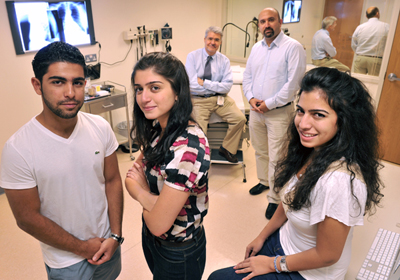Students' Research Study Earns Recognition in Leading Spanish Newspaper
October, 2011

Tarek El Shazly, Rim El Chak, and Deena Wafadari with faculty
members Dr. Pablo Rodriques del Pozo and Dr. Ziyad Mahfoud
Three medical students from WCMC-Q have recently presented their research project at the Annual Summer Conference on Teachers Bio-Ethics in Zaragoza, Spain and consequently had it published in Diario Médico, a leading Spanish medical newspaper.
Tarek Elshazly, Deena Wafadari, and Rim El Chak, all second year medical students, conducted the study under the guidance of their tutor, Dr. Pablo Rodríguez del Pozo, Associate Professor of Public Health, Division of Medical Ethics. The project, called ‘Doctors' Attitudes on Disclosing Information to Cancer Patients in Qatar’, was supported by the Qatar National Research Fund's UREP program (Undergraduate Research Experience Program).
“This was the first time that a study on physicians' attitudes towards informing patients with cancer has been carried out in the Gulf area, and would serve to set a baseline that will help detect changing attitudes in the future,” said Dr. Rodríguez del Pozo. Dr. Ziyad Mahfoud, Assistant Professor of Public Health at WCMC-Q, oversaw statistics and methodology of the study.
The project was aimed at answering questions such as what are doctors’ policies regarding informing – or not informing – patients about their diagnosis of cancer; what factors influence their policies and are these policies flexible?
The wider scope of the study, like every UREP project, was aimed at getting students to experience and understand the complexities involved in conducting such research programs. These issues include understanding the doctrine of informed consent, organizational and problem solving skills, developing procedures to obtain relevant data, and administering a research budget.
Dr. Khaled Machaca, Associate Dean for Research said: “Tarek, Deena, and Rim have proved their capabilities and skills. Working across departments in HMC and with physicians and patients, they have uncovered some interesting facts about the doctor patient relationship in Qatar. Their success highlights the limitless potential of our students at WCMC-Q and the importance of the UREP funding mechanism in advancing student education and research knowhow in Qatar.”
The study the students presented in Spain showed that the vast majority of doctors consider patients must be informed about their diagnosis of cancer. It further concluded that this opinion does not correlate with the physician’s social or demographic status such as age, sex, or national origin. It also found that the majority of physicians are willing to be flexible in their policy on informing patients.
Where doctors were flexible on informing patients, this was largely due to the characteristics of the patient, taking in considerations such as emotional stability, age, and intellectual ability. Another interesting finding is that most of the doctors involved in the study felt that more research should be done in this area and that their policy could change in the future as the result of such research.
“This would show that there is no rigid position among doctors about this issue. On the contrary, there would be a permanent quest for the right policy, even if, in principle, most of them agree that the patient must be kept informed,” says Dr. Rodríguez del Pozo.
Dr. Ismail Helmy, from the Department of Medical Education at Hamad Medical Corporation was the HMC liaison on the project.
